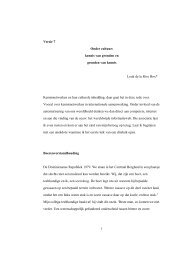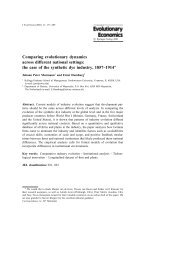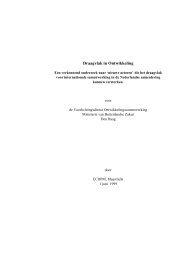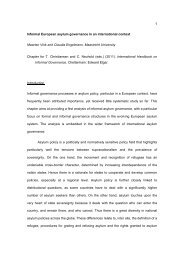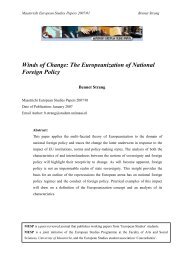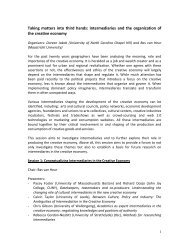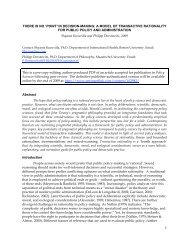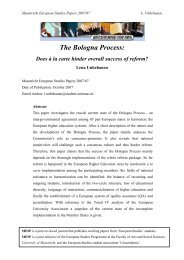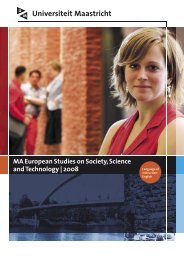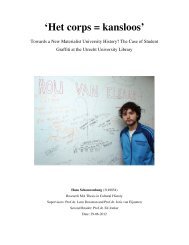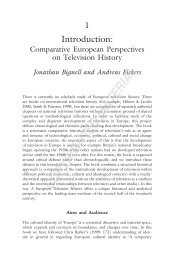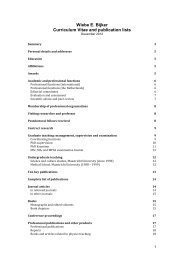Crossing the divide: - Maastricht University
Crossing the divide: - Maastricht University
Crossing the divide: - Maastricht University
You also want an ePaper? Increase the reach of your titles
YUMPU automatically turns print PDFs into web optimized ePapers that Google loves.
It appeared that <strong>the</strong> policy processes in <strong>the</strong> respective countries had not been taken<br />
into account before in <strong>the</strong> formulation of technical assistance programmes. In most<br />
cases <strong>the</strong>re had not been a national dialogue on which assistance priorities could<br />
be based. Cooperation without dialogue, in o<strong>the</strong>r words.<br />
The local researchers became aware of <strong>the</strong> marginal role that many stakeholders<br />
had played in <strong>the</strong> formulation of Science &Technology policies in international<br />
programmes. The researchers noted <strong>the</strong> poor methodological base for cooperation<br />
in research, and <strong>the</strong> lack of research on such cooperation.<br />
Despite grand plans and funding promises <strong>the</strong> European Union has not become <strong>the</strong><br />
major player in science and technology for development. Although <strong>the</strong> mentioned<br />
studies did show that <strong>the</strong>re was ample scope for a European contribution, <strong>the</strong> sorry<br />
state of current European development cooperation in general, and its declining<br />
interest in technological cooperation with <strong>the</strong> South does not augur well for future<br />
programmes. This means that policy dialogues will have to be held at o<strong>the</strong>r levels.<br />
Experiences of o<strong>the</strong>r donors, especially <strong>the</strong> Austrian, British, Danish, Dutch,<br />
Norwegian, Swedish and Swiss will need to form <strong>the</strong> basis of European alliances or<br />
consortia. In all likelihood this will be <strong>the</strong> only way to continue <strong>the</strong> development of<br />
this precious art of policy dialogue in <strong>the</strong> field of scientific and technological<br />
cooperation. An art, which is greatly needed, if we are to believe <strong>the</strong> 2001 Human<br />
Development Report (UNDP 2001).<br />
Conclusion<br />
There is nothing more practical than a good <strong>the</strong>ory was <strong>the</strong> maxim that Rudie van<br />
Lier would impress on his students and colleagues. This founder of a critical school<br />
of socio-historical thought and practice at Leiden and Wageningen Universities<br />
played with <strong>the</strong> notion of praxeology – <strong>the</strong> <strong>the</strong>oretical reflection on policy practice, or<br />
<strong>the</strong> practical application of <strong>the</strong>orizing (Van Lier 1979: 10). He argued, that we need<br />
… a realistic sense of problems and versatile open minds. I think that out of<br />
<strong>the</strong>se operations real multi-disciplinary work will emerge and will later find its<br />
explicit <strong>the</strong>oretical foundation. Multidisciplinary efforts should be in <strong>the</strong> first<br />
place problem-oriented. […] And this means that <strong>the</strong> sociologist or<br />
anthropologist has not only to be trained as a craftsman, but that he should be<br />
supported in his action-oriented approach by a systematic praxeology, a<br />
science of practice.<br />
The study of science and technology as social phenomena incorporates various<br />
schools of thought and brings toge<strong>the</strong>r many disciplines. The discipline of Science<br />
and Technology Studies (STS) is multidisciplinary or it is not. It requires a realistic<br />
sense of problems, because that is <strong>the</strong> pragmatic starting point, which makes for its<br />
societal relevance. It calls for open minds that can transcend <strong>the</strong> order of one<br />
discipline, or of one scientific or technological culture. It is problem oriented in that it



